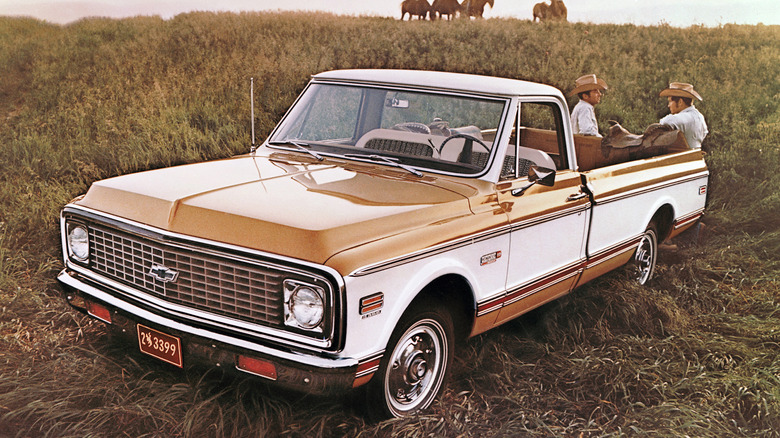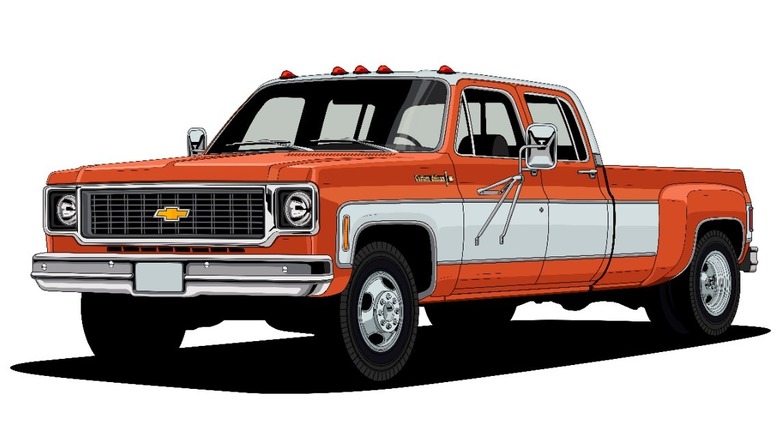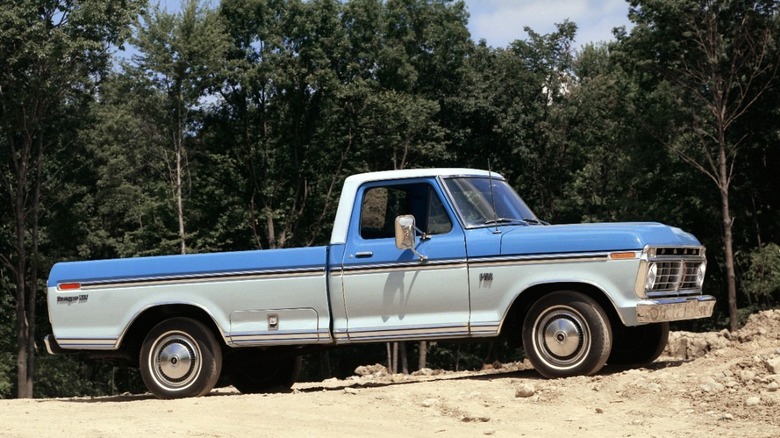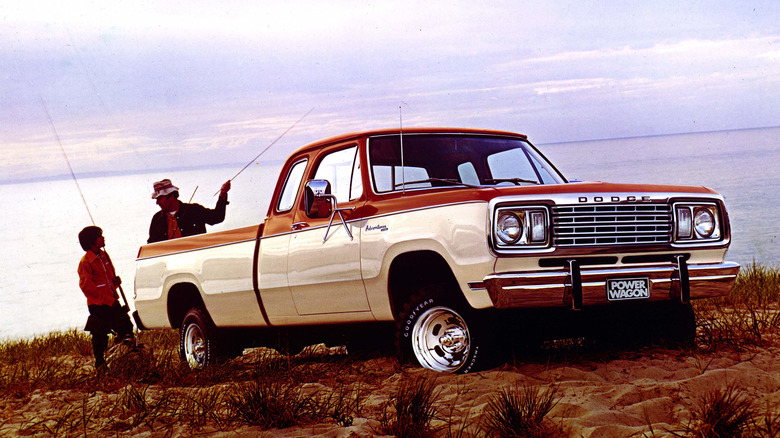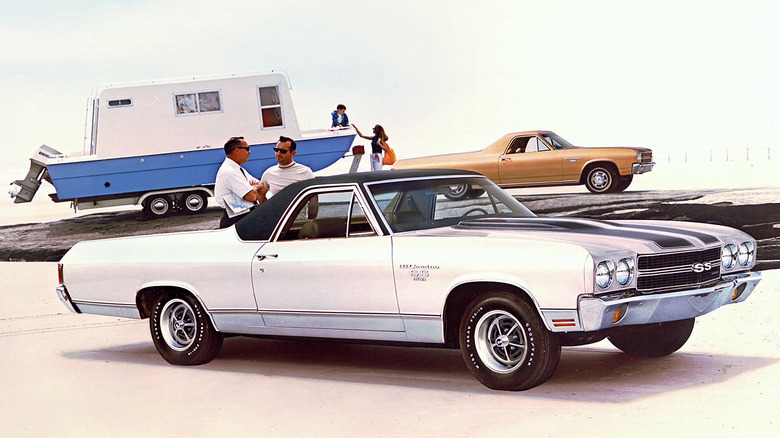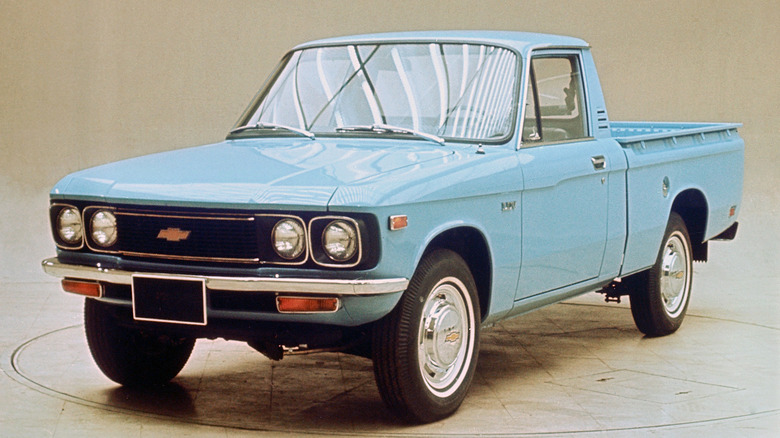5 Classic 1970s Pickups That Would Make Great Farm Trucks
The 1970s produced all sorts of great pickups, many of which are still in use today as workhorses, show cars, everyday haulers, and everything in between. But which trucks from the 1970s would feel at home on the range? Which of the many classic trucks produced in the 1970s can invoke a bit of nostalgia while also being capable enough for continued daily use today?
First, we should define what makes a truck a farm truck. There are some legal definitions for agricultural equipment and farm trucks at both the state and federal levels, with many restrictions for use, including driving distance, licensing, and the cargo they haul, but that's not what we're interested in here. For this list, we're going with a simple list of trucks that would be handy around the farm. They're good at tasks like hauling hay, pulling around small utility trailers, and moving livestock if needed. If you want to indulge your nostalgia while feeding the farm animals, this could be the list for you.
Chevrolet C/K Trucks
Chevrolet trucks are some of the most popular vehicles in the United States — they've been around, in one form or another, for over 100 years. The C and K series of Chevy trucks are considered some of the most desirable Chevy trucks, with a classic design that's still popular today at car shows and drag race events, and in some cases, they're still used as daily drivers.
Technically, production of the C/K trucks began in the late 1960s and carried over into the early 1970s. Then, in 1973, the C/K pickups were redesigned and the era of the Square Body began. Available from 1973 to 1987, the Square Body was GM's longest-running production truck. A truck that lasts that long means lots of spare parts for repairs and many different versions to choose from.
Over the years, multiple cab configurations, bed lengths, and available powertrains have been available, so you'll be spoiled for choice. Single-cab, short-bed C10s are desirable for show vehicles, so they're a bit pricier than the average farm truck. However, variants like the long-bed C30 would be an excellent option for towing hay, moving tools, and generally doing farm work.
Ford F-100
Like the Chevy C/K trucks, the Ford F Series is one of the most popular trucks in America. And, like the Chevy C/K trucks, the F Series has lasted a long time, with many configurations to choose from that spanned the 1970s. As you'd probably expect, there were short and long bed configurations, as well as extended-cab versions, and a number of engines to choose from, including a straight-six and a V8.
The sixth-generation F Series (also known as the Dentside) was built from 1973 to 1979. It was built on the same underpinnings as the fifth-generation truck, so many parts carried over. Thankfully, the 1970s F Series trucks aren't as sought after as Chevy's C10 pickups, so they're still relatively affordable by comparison. The extensive lineup of Ford F Series trucks also includes the larger F-250 (also known as the Highboy), which is one of the best classic trucks for towing — especially useful if you've got a utility trailer or a horse trailer that needs to be pulled around on the farm.
Dodge Power Wagon
While they weren't around as long as the F Series or the Chevrolet C/K Trucks, Dodge Power Wagons are still very desirable and would look great as a tool for the farm. The Power Wagon, which happens to be the first production vehicle from any manufacturer to use four-wheel drive, started its life as a military transport. But when its duties in wartime ended, it became publicly available in 1946 and assumed the Power Wagon name for public sale.
The Power Wagon didn't always look like a converted military vehicle, though — it adopted a similarly boxy shape to its rivals from Ford and Chevy in the '70s and had some of the best styling around. In the 1970s, there were all sorts of cool versions of the Power Wagon, including the Adventurer and the Macho Power Wagon (yes, that was really the name), but those are likely a bit harder to find. For farm truck use, it's probably best to look for Power Wagons in more common configurations.
Chevrolet El Camino
If you don't care about four-wheel drive, towing capability, or boxy looks, an El Camino can definitely do some work around the farm. Just like any good truck should, it's got a functioning bed, but an El Camino has the added benefit of a lower load height than most trucks — making it much easier to load small items in a hurry.
In the 1970s, there were three generations of El Camino. The first and second-gen El Caminos came earlier, but the third generation El Camino was made from 1968 to 1972, the fourth generation from 1973 to 1977, and the fifth (and final) generation of El Camino was made from 1978 until 1987. As was the case with the Chevrolet C/K trucks, the El Camino's long production run meant that lots of these trucks were produced — which should make finding one relatively easy. And, like the Chevy C/K trucks, the El Camino shares many parts with several different GM vehicles, so maintaining one shouldn't be too difficult.
Chevrolet LUV
Before there were compact trucks like the Ford Ranger and the Chevy S-10, there were mini trucks like the Chevrolet LUV. More than just a classic mini truck we wish Chevy would bring back, the LUV is an excellent pickup that could do serious work on any farm.
When small trucks began gaining popularity in the early 1970s, Chevy turned to Isuzu, a brand they partially owned, and started importing the LUV in 1972. The LUV (short for Light Utility Vehicle) wore a Chevy badge, but it was all Isuzu underneath — it was called the Isuzu Faster abroad, where it was pretty much identical. That wasn't a bad thing, though — quite the opposite. Isuzu's small, 75-horsepower truck turned out to be an excellent pickup for daily commuting and serious work. It had a fuel economy estimate of 32 mpg on the highway while also being capable of hauling over 1,400 pounds of cargo. That's impressive even by today's small truck standards.
